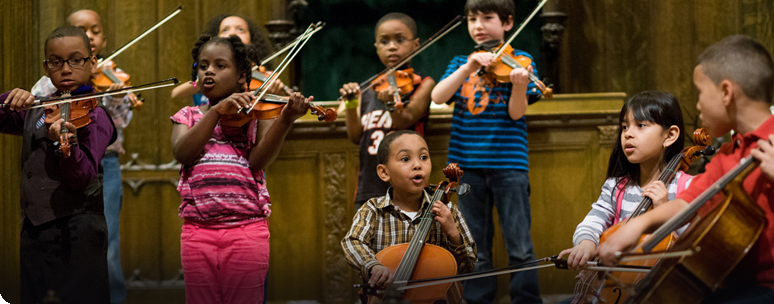Josh
1. If your piece were posted on the CMW website, how would you introduce it?
Our piece is a sample of a viola thrown down 12 notches and made it sound like an acoustic bass. Yeah it pretty much kicks butt in every sense. We [Paul and I] are planning on just freestyle playing on this. It was a Black Violin influence. Shouts to Henry! This will be available for everyone for free to play on. This piece is rugged and street but ambient at the same time.
2. If you were going to tell a friend about this class, how would you describe it? What did we do? What did you learn?
We get on a Mac and use Logic Pro and make hits. Monday is my favorite day of the week because I would come make good music.
3. Has this class affected the way you think about music? How?
I appreciate all types of music now. This class helped me understand the amount of work involved in making all types of music.
4. Has this class affected the way you play or study your instrument? How?
I study more rhythms and different instruments. Also, I pay more attention to keys and melodies.
Paul
1. If your piece were posted on the CMW website, how would you introduce it?
I partnered up with Josh to work on a piece. In our piece we recorded ourselves playing our instruments and then put the recording on the computer. After, we made a beat using a keyboard. The keyboard we used could be used to sound like a drum or a violin or anything else. After we made the beat with the keyboard, we added the recording of ourselves. At first, the recording didn't match up with each other so we altered the recording to sync with the beat. Shout out to my boy Henry.
2. If you were going to tell a friend about this class, how would you describe it? What did we do? What did you learn?
If I was to describe this class to a friend I would tell them that this class is dead bangin'. We use a program called Logic Pro to make beats and we can record ourselves playing our instrument and sync it with the beat. So the class is fun.
3. Has this class affected the way you think about music? How?
This class has affected my thinking on music in a way that allows me to realize I can do so much work with music besides playing just sheet music.
4. Has this class affected the way you play or study your instrument? How?
This class has affected how I play my instrument because I don't always have to play classical music.
Alana
1. If your piece were posted on the CMW website, how would you introduce it?
In the first half of my piece you're at a night club. Also in this part I included an improvisation part. Then once this part finishes, you are now waiting for the bus. You are now on your way home. I also used an improvisation part in this. In both sections I included a recording of me and Angie from when we were taking our expedition with Micah and Paloma. When I shared this piece at the Performance Party it was very exciting because I saw many people nodding their heads to my beat. It was very fun! But I also have to give props to Logic Pro because I found many loops to create my piece there.
2. If you were going to tell a friend about this class, how would you describe it? What did we do? What did you learn?
If I were to describe Media Lab to my friend I would say, "It's a class I go to every Monday and we make our own tracks on this program called Logic Pro. This program allows me to share my favorite styles."
3. Has this class affected the way you think about music? How?
This class has affected the way I think about music now because I see that you can take all different styles of music and it can still sound awesome and cool.
4. Has this class affected the way you play or study your instrument? How?
This class has affected the way I play and study music because now I can always take my violin and improvise over my piece.
